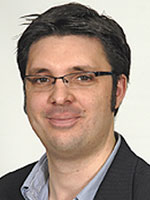Dr William Purkis
Contact Details
Department of Medieval History
University of Birmingham
Edgbaston
Birmingham
B15 2TT
0121 414 5664
Email: w.j.purkis@bham.ac.uk
Background
When and where did you initially develop an interest in the history of the crusades and/or the Latin East?
My first memory of the crusades is reading a Ladybird History of Richard the Lionheart as a child, but it was not until I studied History at Lancaster University that I developed a serious interest in the subject.
Who or what sparked your enthusiasm for the subject?
As an undergraduate at Lancaster I took a module on crusading that was taught by Andrew Jotischky.
Education
Please provide details of your Higher Education, including dates, institution(s) and the name(s) of your research supervisors.
| 1996 – 1999 | BA (Hons) in History, Lancaster University |
| 1999 – 2000 | MA in Historical Research, Lancaster University (dissertation supervised by Andrew Jotischky and Michael Mullett). |
| 2001 – 2005 | PhD in History, Emmanuel College, University of Cambridge (dissertation supervised by Jonathan Riley-Smith) |
Career History
Please provide details of your academic career history, including confirmation of your current institutional affiliation and contact details.
| 2004 – 2006 | Associate Teacher, Royal Holloway, University of London |
| 2005 – 2007 | Teaching Assistant, Queen Mary, University of London |
| 2007 – present | Lecturer in Medieval History, University of Birmingham |
Influences and Methodologies
What ideas and/or methodologies have informed your approach to your research?
I approach the crusades from a more general interest in medieval religious culture. As such, my research is driven by a desire to contextualise crusading within a broader historiographical framework than is often the case in much modern scholarship. Consequently, my approaches and interests are influenced as much by those who work on, say, monastic spirituality and ecclesiastical reform (especially Giles Constable and Caroline Walker Bynum), pilgrimage, and, more recently, scholars of medieval memory, historical writing and perceptions of the past.
Research Outlook
What do you consider to be the most important avenues for future research in the field of crusader studies?
N/C
Research Output
Please provide details of your research output, including publications and other media as appropriate.
- ‘Stigmata on the First Crusade’, in Signs, Wonders, Miracles: Representations of Divine Power in the Life of the Church, ed K Cooper and J Gregory, Studies in Church History, vol 41 (Woodbridge, 2005), pp 99-108.
- ‘Elite and Popular Perceptions of imitatio Christi in Twelfth-Century Crusade Spirituality’, in Elite and Popular Religion, ed K Cooper and J Gregory, Studies in Church History, vol 42 (Woodbridge, 2006), pp 54-64.
- Crusading Spirituality in the Holy Land and Iberia, c 1095–c 1187 (Forthcoming: Boydell and Brewer, 2008).
- ‘Religious Symbols and Practices: Monastic Spirituality, Pilgrimage and Crusade’ (Forthcoming).
- ‘Miracles as Propaganda’, ‘Miracles of Protection’, ‘Miracles of Rescue’, entries in the Encyclopaedia of Medieval Pilgrimage (Forthcoming: Brill, 2009).

